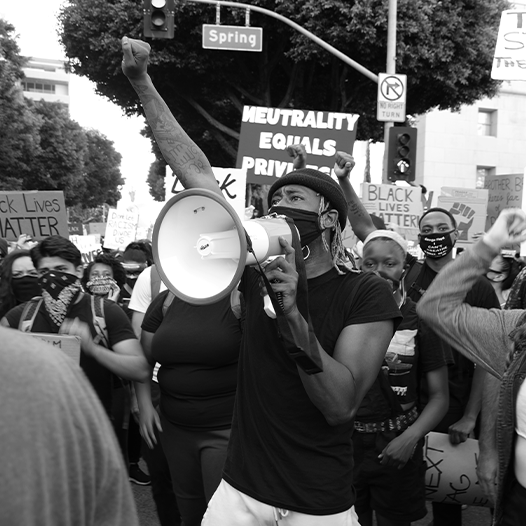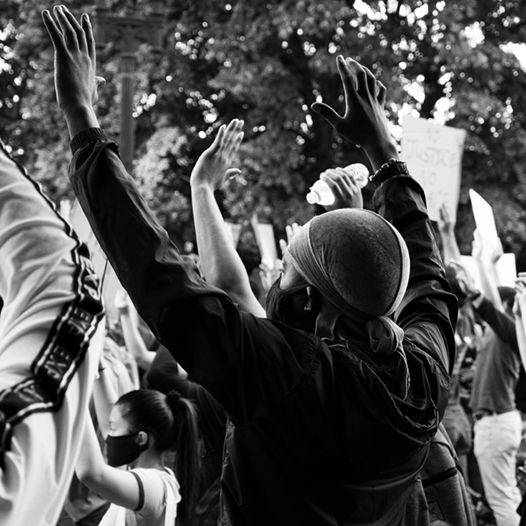Archives are not just records of the past—they are vital tools for justice, memory, and transformation. For the Movement for Black Lives (M4BL), the creation of an archive is both a radical act of preservation and a challenge to the systems that have historically erased Black voices. As we mark ten years of revolutionary organizing, the urgency of this work cannot be overstated.
Black archives are sites of resistance. They resist the whitewashing of history, where Black liberation movements are often mischaracterized or diminished. The preservation of authentic narratives, in the words and artifacts of the organizers themselves, protects against distortions that have too often plagued our collective memory. From oral histories to protest signs, each artifact tells a story of courage, vision, and community that mainstream institutions frequently ignore or devalue.
The M4BL archival project represents a profound intervention into traditional archiving methods, which have largely prioritized white, patriarchal perspectives. By embracing Black archival practices that center care, embodiment, and repair, we honor the depth and complexity of Black life. These practices, as outlined by archivists like Zakiya Collier and Tonia Sutherland, celebrate the everyday and extraordinary elements of Black existence. They affirm that Black memory work is vibrant, sacred, and alive—a testament to the ongoing fight for liberation.
At its core, the M4BL archive is about ownership. It ensures that the history of Black liberation is documented on our terms, by us, for future generations. This work is an act of self-determination, breaking free from the constraints of systems that have long sought to diminish our power. It creates a resource for activists, educators, and historians to learn from our victories and struggles, ensuring that the wisdom of this movement informs the battles yet to come.
The archive is also a space of inspiration and hope. In preserving the voices, images, and objects of this movement, we build a bridge between generations. We create a living collection that not only reflects where we have been but also lights the way forward. In this way, the M4BL archive is not simply a repository; it is a call to action, reminding us that the struggle for justice is ongoing and that every step matters.
As we commemorate ten years of organizing, we invite you to join us in building and celebrating this archive. It is a collective endeavor, one that requires the contributions, care, and vision of all who believe in Black liberation. Together, we will ensure that our stories are preserved, our legacies honored, and our futures imagined with the full force of our creativity and power.
Let this archive be a testament to the beauty, resilience, and brilliance of Black life. Let it be a reminder that our fight for freedom is rooted in memory, in truth, and in an unshakable belief in our collective power.


 Izetta Autumn Mobley completed her doctoral studies in American studies at the University of Maryland, College Park. Her research focuses on race, disability, slavery, public history, digital humanities, and material and visual culture. In addition to her work as a scholar she has extensive experience within the cultural sector, working with Shakespeare Theatre, Woolly Mammoth Theatre, the Institute for Museum and Library Services, the National Endowment for the Arts, Humanities D.C., the Office of Historic Alexandria, the Smithsonian National Museum of African Art, and the DC History Conference. She received the Walter B. Hill Fellowship at the Banneker-Douglass Museum and the Woods Research Fellowship at the College of Physicians of Philadelphia. She has served as co-chair for the D.C. History Conference, a city-wide conference on the history of Washington, D.C. In 2020, she was the program committee co-chair for the Association of African American Museums conference. She is also a faculty member for the National Museum of African American History and Culture’s Interpretive Workshop Dr. Mobley is a Certified Interpretive Guide and creator of The Site Unseen, which provides tours focused on exploring submerged, neglected, or under-examined history and culture. She previously lectured at the Brown University Watson Institute and was faculty for the Brown University in Washington program.
Izetta Autumn Mobley completed her doctoral studies in American studies at the University of Maryland, College Park. Her research focuses on race, disability, slavery, public history, digital humanities, and material and visual culture. In addition to her work as a scholar she has extensive experience within the cultural sector, working with Shakespeare Theatre, Woolly Mammoth Theatre, the Institute for Museum and Library Services, the National Endowment for the Arts, Humanities D.C., the Office of Historic Alexandria, the Smithsonian National Museum of African Art, and the DC History Conference. She received the Walter B. Hill Fellowship at the Banneker-Douglass Museum and the Woods Research Fellowship at the College of Physicians of Philadelphia. She has served as co-chair for the D.C. History Conference, a city-wide conference on the history of Washington, D.C. In 2020, she was the program committee co-chair for the Association of African American Museums conference. She is also a faculty member for the National Museum of African American History and Culture’s Interpretive Workshop Dr. Mobley is a Certified Interpretive Guide and creator of The Site Unseen, which provides tours focused on exploring submerged, neglected, or under-examined history and culture. She previously lectured at the Brown University Watson Institute and was faculty for the Brown University in Washington program.